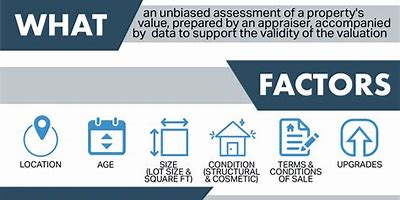
Navigating the San Antonio real estate market requires a keen understanding of property values. Whether you're buying, selling, refinancing, or simply assessing your assets, a professional appraisal is a crucial step. San Antonio, with its rich history and diverse neighborhoods, presents unique challenges and opportunities in the world of real estate appraisal. From the historic homes of Alamo Heights to the modern developments in Stone Oak, understanding the nuances of each area is essential for accurate property valuation. This article will delve into the world of real estate appraisal in San Antonio, Texas, exploring the process, the importance of hiring a qualified appraiser, and the factors that influence property values in this vibrant city. We will also discuss how to find the right appraisal professional for your specific needs and how to prepare for the appraisal process to ensure a smooth and accurate valuation of your property. Understanding these key elements will empower you to make informed decisions about your real estate investments in San Antonio.
WATCH
What is a Real Estate Appraisal?

A real estate appraisal is an unbiased professional opinion of a property's value. It's typically required by lenders during the mortgage process to ensure that the property is worth the amount being borrowed. However, appraisals are also useful for other purposes, such as estate planning, tax assessments, and divorce settlements. The appraisal process involves a thorough inspection of the property, analysis of comparable sales (comps) in the area, and consideration of various factors that can influence value, such as location, condition, and market trends. A licensed appraiser develops a comprehensive report detailing the property's characteristics, the methodology used, and the final opinion of value. This report provides a crucial piece of information for all parties involved in a real estate transaction, ensuring transparency and fairness.
WATCH
The Appraisal Process in San Antonio

The appraisal process in San Antonio generally follows these steps:
**Order Placement:** The lender (or the homeowner, in some cases) orders the appraisal from a licensed appraiser.
**Inspection:** The appraiser schedules a visit to the property to conduct a thorough inspection. They will assess the interior and exterior of the home, noting its condition, size, features, and any improvements or deficiencies.
**Data Collection:** The appraiser gathers data on comparable sales in the neighborhood, considering properties that are similar in size, age, condition, and location. They also research market trends and other relevant factors.
**Analysis:** The appraiser analyzes the collected data, comparing the subject property to the comparable sales and making adjustments for any differences. They use various appraisal methods, such as the sales comparison approach, cost approach, and income approach (for income-producing properties).
**Report Preparation:** The appraiser prepares a detailed report outlining the appraisal process, the data used, the analysis performed, and the final opinion of value. This report is then submitted to the client.
WATCH
Factors Influencing Property Values in San Antonio

Several factors can influence property values in San Antonio, and appraisers must consider these when determining a property's worth:
**Location:** Location is paramount. Properties in desirable neighborhoods with good schools, convenient access to amenities, and low crime rates generally command higher prices. Proximity to major employers, parks, and transportation routes also plays a significant role.
**Condition:** The condition of the property is a major factor. Well-maintained homes with updated features and no deferred maintenance will typically appraise higher than those in need of repairs.
**Size and Features:** The size of the home, the number of bedrooms and bathrooms, and the presence of desirable features like a swimming pool, updated kitchen, or finished basement all contribute to its value.
**Market Trends:** The overall real estate market conditions in San Antonio, including supply and demand, interest rates, and economic factors, can significantly impact property values. A strong seller's market will generally drive prices up, while a buyer's market may lead to lower valuations.
**Comparable Sales:** Recent sales of similar properties in the area are a key indicator of value. Appraisers carefully analyze these "comps" to determine a fair market value for the subject property.
WATCH
Choosing the Right Appraiser in San Antonio
Selecting the right appraiser is crucial for obtaining an accurate and reliable valuation. Here's what to look for:
**Licensing and Certification:** Ensure the appraiser is licensed and certified by the Texas Appraiser Licensing and Certification Board (TALCB). This confirms they have met the necessary education, experience, and examination requirements.
**Experience:** Look for an appraiser with experience in the San Antonio market, particularly in the specific neighborhood where the property is located. They should be familiar with local market trends and property values.
**Reputation:** Check the appraiser's reputation by reading online reviews and asking for referrals from real estate agents, lenders, or other professionals.
**Communication:** Choose an appraiser who is communicative and responsive, willing to answer your questions and explain the appraisal process.
**Independence:** The appraiser should be independent and unbiased, with no vested interest in the outcome of the appraisal.
WATCH
Preparing for Your Real Estate Appraisal

Here are some tips to prepare your property for an appraisal:
**Clean and Declutter:** A clean and tidy home creates a positive impression and allows the appraiser to easily assess the property. Remove clutter and ensure all areas are accessible.
**Make Necessary Repairs:** Address any minor repairs, such as leaky faucets, broken light fixtures, or cracked tiles. This shows that the property is well-maintained.
**Highlight Improvements:** Provide the appraiser with a list of any recent improvements or renovations you've made to the property, such as a new roof, updated kitchen, or remodeled bathroom. Include documentation of the costs, if available.
**Landscaping:** Ensure the yard is well-maintained, with trimmed lawns, pruned shrubs, and clear walkways. Curb appeal is important.
**Be Present (If Possible):** If possible, be present during the appraisal to answer any questions the appraiser may have and provide additional information about the property.
WATCH
Understanding the Appraisal Report
The appraisal report is a comprehensive document that outlines the appraiser's findings and opinion of value. It typically includes the following sections:
**Property Description:** A detailed description of the property, including its address, size, age, condition, and features.
**Neighborhood Analysis:** An overview of the neighborhood, including its demographics, amenities, and market trends.
**Comparable Sales Analysis:** A presentation of the comparable sales used in the appraisal, with adjustments made for any differences between the subject property and the comps.
**Valuation Approaches:** A discussion of the appraisal methods used, such as the sales comparison approach, cost approach, and income approach (if applicable).
**Final Opinion of Value:** The appraiser's final opinion of the property's market value, based on their analysis.
**Certifications and Disclaimers:** Statements affirming the appraiser's qualifications, independence, and compliance with appraisal standards.
WATCH
What to Do If You Disagree with the Appraisal
If you disagree with the appraisal, you have several options:
**Review the Report:** Carefully review the report for any errors or inconsistencies. If you find any, bring them to the attention of the lender and the appraiser.
**Provide Additional Information:** Provide the appraiser with any additional information that may support a higher value, such as recent comparable sales that were not included in the report or documentation of significant improvements.
**Request a Reconsideration of Value:** Formally request a reconsideration of value from the lender, providing your reasons for disagreeing with the appraisal and supporting documentation.
**Order a Second Appraisal:** As a last resort, you can order a second appraisal from a different appraiser. However, be aware that you will typically have to pay for this appraisal yourself, and there is no guarantee that it will result in a higher value.
WATCH
The Importance of Local Expertise
Understanding the unique characteristics of the San Antonio real estate market is essential for accurate appraisals. An appraiser familiar with the local market will be able to account for factors such as:
**Neighborhood Specifics:** San Antonio has a diverse range of neighborhoods, each with its own distinct character, amenities, and property values. An appraiser with local expertise will understand these nuances and be able to accurately assess the value of properties in different areas.
**Historic Preservation:** Many neighborhoods in San Antonio have historic preservation guidelines that can impact property values. An appraiser familiar with these guidelines will be able to consider their effects on the appraisal.
**Military Presence:** San Antonio has a significant military presence, which can influence the demand for housing in certain areas. An appraiser with local knowledge will be aware of this and its potential impact on property values.
**Local Economic Factors:** The San Antonio economy is diverse and dynamic. An appraiser with local expertise will be able to consider the effects of local economic factors on the real estate market.
WATCH
The Role of Technology in Modern Appraisals
Technology plays an increasingly important role in modern appraisals. Appraisers now use sophisticated software and online databases to access market data, analyze comparable sales, and generate reports. Geographic Information Systems (GIS) are used to map property locations and analyze neighborhood characteristics. Automated Valuation Models (AVMs) are used as a supplementary tool to estimate property values, although they are not a substitute for a professional appraisal. Digital photography and electronic data collection tools are used to document property features and conditions. These technological advancements enhance the efficiency and accuracy of the appraisal process, allowing appraisers to provide more informed and reliable valuations. Furthermore, the use of mobile appraisal apps allows for real-time data capture and report generation, streamlining the workflow and improving turnaround times. Despite these technological advancements, the human element remains crucial, as appraisers must use their expertise and judgment to interpret data and account for unique property characteristics.
WATCH
Post a Comment for "San Antonio Property Values: Decoding the Alamo City Real Estate Market"